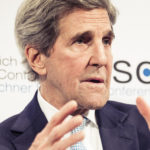
Wikimedia Commons
One of the Jackson Institute for Global Affairs’ newest fellows remains under investigation in Canada for ethics violations.
Bill Morneau, the former finance minister of Canada, joined the Jackson Institute as a senior fellow this January. As finance minister from 2015 to 2020, he oversaw the Canadian response to the COVID-19 pandemic and subsequent recession. Before that he was the CEO of Morneau Shepell, the largest human resources provider in Canada. This semester he is teaching GLBL 811, “Global Economic Coordination and Cooperation: A Finance Minister’s Perspective.” Morneau, however, remains under investigation by the Canadian Conflict of Interest and Ethics Commissioner.
GLBL 811 leverages Morneau’s experience as finance minister to teach students how to engage at a macroeconomic level with the international community. In the class, students examine international economic mechanisms, such as the International Monetary Fund.
Morneau has been under investigation by Mario Dion, the Canadian conflict of interest and ethics commissioner, over his involvement in the WE Charity scandal that has dogged the Trudeau administration for nearly a year. The controversy emerged after the federal government awarded a contract to WE Charity in May of 2020 to operate the $912 million Canada Student Service Grant program, which pays for students and new graduates to complete volunteer work, up to $5,000 for 500 hours, in order to offset the economic impacts of the pandemic. Morneau was accused of improperly accepting gifts of free travel in 2017 from the charity, totaling $41,000. Despite being cleared of impropriety regarding the travel expenses, he remains under investigation regarding his family’s ties to the charity.
The conflict of interest in question relates to the roles Morneau’s family members played in the charity. One of Morneau’s daughters worked in an administrative role at WE for a year, from 2019 to August 2020, another gave speeches and started a pen pal project in the charity and he and his wife, Nancy McCain, made two donations to the charity totaling $100,000 in June 2018 and June 2020.
“During my time in politics, I always strove to uphold the highest ethical standards and I was pleased to be cleared by Canada’s Ethics Commissioner last fall on the investigation related to my visit to WE Charity’s school facilities,” Morneau wrote to the News in an email. “The Commissioner continues to investigate whether the Prime Minister and I should have attended a cabinet meeting to discuss a program that was aimed at helping students gain meaningful work experience during one of the greatest economic challenges of our lifetimes. I have already publicly stated that in retrospect, while there was no conflict, I should have recused myself from this discussion.”
Neither the Jackson Institute nor the University responded to multiple requests for comment.
“Our Office can confirm that Commissioner Dion is currently investigating former Finance Minister Bill Morneau for possible contraventions of subsection 6(1) and section 21 of the Conflict of Interest Act in relation to the administration of the Canada Student Service Grant by WE Charity,” said Jocelyne Brisebois, a spokesperson for the Office of the Conflict of Interest and Ethics Commissioner, in an email to the News.
Section 6(1) of the Conflict of Interest Act says that “No public office holder shall make a decision or participate in making a decision related to the exercise of an official power, duty or function if the public office holder knows or reasonably should know that, in the making of the decision, he or she would be in a conflict of interest.”
Section 21 relates to the duty to recuse, and says that “A public office holder shall recuse himself or herself from any discussion, decision, debate or vote on any matter in respect of which he or she would be in a conflict of interest.”
The Office of the Conflict of Interest and Ethics Commissioner provided no further comment on the ongoing investigation into Morneau’s relationship with WE Charity, saying that “all investigations are conducted confidentially to preserve the integrity and fairness of the investigative process.”
In an email to the News, political science professor and member of the Yale MacMillan Center’s Canadian Studies Committee David Cameron explained the controversy, saying that Trudeau himself has financial family ties to the charity, with his mother, wife and brother all being paid for speaking events with the charity. Both Trudeau and Morneau, Cameron said, have been criticized for not recusing themselves from the cabinet discussions over the charity.
“It is a bit strange that [Jackson] would be appointing him as a senior fellow especially before the end of the investigation,” said Grace Baghdadi ’22, a global affairs major. “Maybe they do believe he is innocent, but they could have at least waited a couple more months until the investigation comes to fruition because right now it doesn’t look great for Yale to be condoning some potentially wrong actions.”
The investigations into Morneau’s conduct began in July 2020. He resigned abruptly from his position in August 2020, when the scandal was dominating Canadian politics — and before the investigations concluded. According to Morneau, he resigned in order to run for the secretary-general of the Organization for Economic Cooperation and Development; however, he withdrew his candidacy in January after falling short of the requisite votes to proceed to the next round.
On the Jackson Institute website, Morneau’s description still lists him as a candidate for the secretary-general of the OECD, suggesting he was hired while still in the running for the position.
This is not the first time Morneau has been under ethical scrutiny. Brisebois said that Morneau was under investigation by the same body for conflict of interest violations in 2018 with regard to a bill to amend pension benefits.
“It had been alleged that Mr. Morneau was in a conflict of interest because Bill C-27 could further his interests as a shareholder of Morneau Shepell Inc., which is a major administrator of pension plans,” she said.
However, because the bill applied to all pensions generally, and did not specifically benefit Morneau’s family company, he was not in a conflict of interest.
Moreover, in September 2020, nearly a month after he had resigned from Canadian government, Morneau admitted to violating federal election law after he lent political support to two Liberal Party candidates at government events in the preelection period. Morneau agreed to pay a $300 fine. Though the election commissioner determined that such promotion was not deliberate or planned by Morneau himself, it nevertheless provided partisan benefit and was therefore illegal.
The Jackson Institute plans to transition to a graduate school by 2022.
Philip Mousavizadeh | philip.mousavizadeh@yale.edu










